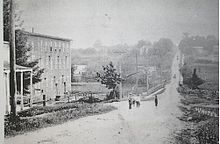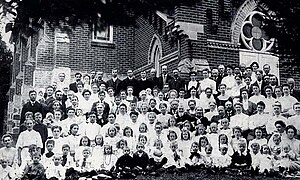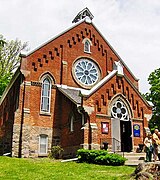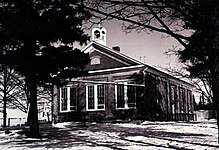|
Whitevale, Ontario
Whitevale, formerly Majorville, is a community located within the City of Pickering in Durham Region, Ontario, Canada. The city refers to the community as the "Hamlet of Whitevale".[1] HistoryWhitevale was an excellent example of nineteenth-century industry concentrating by a power source and then expanding of its own accord.[2]  SettlementThe community was first settled in the 1820s when John Major built a sawmill. The community was known as Major or Majorville, because of the mill and the number of Majors who lived close by on the 5th Concession line.[2] Around 1855 Truman P. White bought the saw mill, built a gristmill and a cooperage; and in 1866 built a planing factory. The community owed so much of its development and business prosperity to T.P. White that in acknowledgement, it adopted Whitevale as its permanent designation.[3]  GrowthThe newly named community of Whitevale may be said to have had its beginning in the year 1855. In that year Donald McPhee opened the first store and T.P. White erected a grist mill that cost $10,000, which for equipment far surpassed all others in the township at the time. In 1866 he built a large planing mill and in 1867 a large four storey brick woolen mill, that cost about $30,000. The woolen mill was leased and operated for some years by Mr. Ellis, the grist mill in the year 1867 to 1874 by the Spink brothers and the sawmill by the Besse brothers.[3]  Prosperous TimesWhitevale during these years was a busy place. In 1890 Whitevale contained a stave and heading factory and a barrel factory both owned and operated by the Spink brothers; three general stores, one owned by James Taylor and Donald McPhee; a wagon and carriage factory, operated by the Pollard brothers; a cheese factory, owned and operated by P.R. Hoover and Co.; the merchant and tailoring firm of J. Rose and Son; the shoemaker shops of John Allen and D. Moodey; the butcher shop of Israel Burton and the tinsmith shop of S.B. Wigmore. In addition, Whitevale contained two blacksmiths, two wagon shops, a school house, undertakers, harness shop, grist mill, brush factory, grindstone factory, barber shop, three dressmakers, three gardeners, money order and post offices, hotel, brass band, two churches and four lodges.[3] Important Historical StructuresWhitevale Church The Whitevale Church was built to replace the 1854 Wesleyan Stone Church located behind the present-day cemetery.[4] The Whitevale Church was built as a Methodist Church in 1884 and had its Church Dedication in February 1885 with "congregations overflowing".[5] The church became Whitevale United Church in 1925 with a total congregation of 106 members recorded in 1929.[5]
Following the announcement by the Ontario Government in 1972 threatening expropriation for a new airport, many of the congregation moved away. In 2009–2010, the United Church Presbytery put the church up for sale and the Whitevale community came together to try and raise funds to keep the heritage church as part of the community.[6] Recently, the church was purchased and is now a Greek Orthodox Church. As the only remaining church in Whitevale, it remains virtually unaltered and is a very good example of Gothic Revival architecture.[6]
CemeteryThe Whitevale Cemetery 43°53′25″N 79°08′36″W / 43.8902°N 79.1434°W was established in 1832. This pioneer cemetery sits just east of the central village on Whitevale Road. The land was donated by Henry Major, son of the first settler, John Major.[7][8] The final resting place of the hamlet's name sake Truman P. White,[9] as well as the headstones of the members of the Major family can also be found here. There are also two war graves: William Henry Emsely – a Lieutenant Colonel from World War I and Alfred Frederick Griffin – a Pilot Officer from World War II.[10] There is a stone lying on the ground of the cemetery which reads "An Unknown Stranger 1854". According to the century-old tale, a man who was passing through Whitevale, decided to stay the night at the Whitevale Hotel. The next day, he was discovered dead with no explanation for his death. He also carried no identification which led the residents of Whitevale having to bury him in the cemetery with a simple plaque.
Fires Fires destroyed many of Whitevale's booming industries and continually changed the face of town. A public hall which had been erected in 1860 was also lost due to fire. A carriage factory and the Cooperage went in 1874. The woolen mill was the next to experience a fire several years later, but the brick walls remained standing. This was later followed by the destruction of the planing mill and the Grist mill, which was then being operated by Mr. White himself. The planing mill was rebuilt on the site of the grist mill and subsequently burned in 1899. The grist mill machinery was rebuilt inside the fire-damaged brick walls of the old woolen mill.[3] A devastating fire leveled the converted grist mill in 1961, but a modern feed mill was erected on the same site in 1962.[4] In early 2011, the Regency Coffee Co. building (which includes a portion of the building that dates back to the 1880s) caught on fire during renovations, but only sustained smoke and roof damage.[11] Floods  The Whitevale Bridge has suffered from at least three separate occasions of flooding. In 1929 a heavy flood completely washed out the newly built bridge. In October 1954, the mill dam and the approach to the Whitevale Bridge (not the entire bridge) went out due to Hurricane Hazel when Duffins Creek overflowed.[12] Finally, in July 2008 the concrete bridge suffered minor damage when heavy rains washed out a small section. The previous bridge was demolished in 2014 and replaced by the current structure. Historic Organizations
Present dayCommunity Events  Annual events include the Fisherman's Breakfast held in April at the community centre,[13] the Corn Roast held at the Whitevale Church at the end of the summer,[14] Whitevale Porchfest held on porches throughout the village in September, and the Whitevale Spring Festival which has been held every May since 1972.[15] These events are held for both residents and out-of-towners. The Whitevale and District Residents' Association (WDRA) helps organize events and oversees many aspects of the community, looking out for the best interests of the town and its citizens. Businesses
Facilities
Film shoots Television
Movies
Notes
External links
|
||||||||||||||||||||||||||||||||||||||||||||











